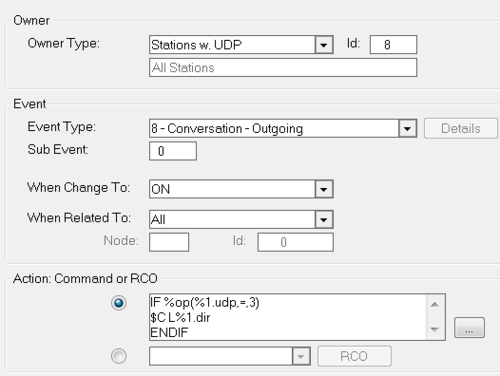Difference between revisions of "%1.udp"
From Zenitel Wiki
| Line 1: | Line 1: | ||
| − | + | Return the [[UDP group]] memberships for station, as a decimal number. | |
| − | |||
| − | |||
| − | Return the [[UDP group]] memberships for station, as a decimal number. | ||
* Interpret the number as a bitmap, bit#0 is UDP group 1, bit#7 is UDP group 8 | * Interpret the number as a bitmap, bit#0 is UDP group 1, bit#7 is UDP group 8 | ||
| + | Example: If a station is member of UDP group 1, 4 and 8, %1.udp will return value 137. | ||
* %2.udp can also be used if related-to is in local exchange | * %2.udp can also be used if related-to is in local exchange | ||
| Line 12: | Line 10: | ||
Value: 1 2 4 8 16 32 64 128 | Value: 1 2 4 8 16 32 64 128 | ||
| − | Example: If | + | |
| + | Example: If calling station is member og UDP group 3, then cancel the call. | ||
| + | [[File:EventHandlerMacro UDP.PNG|thumb|left|500px]] | ||
| + | <br style="clear:both;" /> | ||
| + | |||
Back to [[Event_Handler#List_of_context_parameters]]. | Back to [[Event_Handler#List_of_context_parameters]]. | ||
Revision as of 13:56, 26 May 2015
Return the UDP group memberships for station, as a decimal number.
- Interpret the number as a bitmap, bit#0 is UDP group 1, bit#7 is UDP group 8
Example: If a station is member of UDP group 1, 4 and 8, %1.udp will return value 137.
- %2.udp can also be used if related-to is in local exchange
UDP group: 1 2 3 4 5 6 7 8 Bit: 0 1 2 3 4 5 6 7 Value: 1 2 4 8 16 32 64 128
Example: If calling station is member og UDP group 3, then cancel the call.

